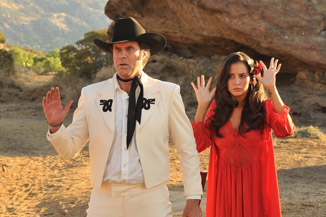Review: Casa de mi Padre
It Sure is Loco, But It is Also Muy, Muy Divertido
By Tom Houseman
March 19, 2012
BoxOfficeProphets.com

A crew of SNL alumni, including director Matt Piedmont, writer Andrew Steele, and producing partners Ferrell and Adam McKay, have created a film that is completely different from anything anyone else is doing right now. It is equal parts homage to and parody of Mexploitation films, a genre you probably don't know existed (I wasn't sure whether or not I was making up the word Mexploitation before I googled it), and everything about it is designed to not just be weird, but bad. Very, very intentionally bad. The painfully stilted dialogue, the clearly fake sets, the obvious continuity errors, are all part of the world that is Casa de mi Padre. I would give examples of ridiculous moments that define this film, but the element of surprise is so crucial to the success of this kind of comedy that any forewarning would ruin it. Suffice to say that while there are a few elements that conform to audience expectations, mostly the film revels in how outrageous and unnatural it is.
Will Ferrell plays a character that is not a stranger to anyone familiar with his ouvre. He is Armando, a dumb simpleton with a good heart who must step up to protect his family when a drug gang begins committing crimes on his father's ranch. One of Ferrell's many talents as a comedic actor is his total dedication to playing the most foolish characters, creating humor out of how seriously he takes the most absurd situations and ridiculous dialogue. The effect is heightened when he sounds as if he does not have a full grasp of the language he is speaking, and while his Spanish is capable, it heightens the ridiculousness of the gravity he brings to every line. You could not find a better trio at creating awkward situations than Ferrell, Efren Ramirez, and Adrien Martinez. Every scene that features the three of them goes on a touch too long, with allows them to fill the vacuum of extra time with a laugh or a silence that somehow gets funnier with repetition.
What makes Casa de mi Padre is that in creating an intentionally bad movie, Steele and Piedmont were able to control the chaos, driving it forward rather then letting it fly around like a garden hose on full blast. When Ferrell is allowed free reign he often takes his schtick too far, but here he is always focused on the task at hand, which makes him that much funnier. Perhaps it is because speaking in a foreign language took away his ability to improvise, but the result is one of the cleanest, smoothest Ferrell comedies, even as it revels in its flaws. Steele and Piedmont also make very strong choices with each scene. They are not merely throwing jokes at the wall to see what sticks, but rather making strong, bold decisions that feel right within the context of the film, often because they feel so wrong.
Casa de mi Padre is obviously a descendant of the FunnyOrDie mentality, which makes sense considering that the men behind it are also responsible for that site. FunnyOrDie often takes a simple idea and carries it out to its most illogical extreme. Casa de mi Padre has very little narrative thread to it; rather, it focuses on making each scene as funny as possible through stylized absurdity. Both the grand gestures and the small details propel the action within a scene, and there are so many great moments either driven by the conflict or largely tangential to it. The movie is at its least funny when it has to spend time on the narrative, which is so flimsy that it might disintegrate without anyone - either on screen or in the audience - noticing.
Yet at 84 minutes Casa de mi Padre does not outstay its welcome. Each scene is paced perfectly, and they are strung together effectively enough that the film never drags. Some scenes are entirely disconnected from the plot, but they move so quickly, head down and laughs first, that they do not feel like distractions but rather additional opportunities to wring comedy from the infinitely-damp sponge of this concept. If you enjoy Will Ferrell you can trust that he knows what he is doing with such an unusual film and embrace Casa de mi Padre for its intentional badness and absurdity. Some might find the style and comedy grating, but for those willing to dive into the insanity of the story, you can feel safe knowing that it will catch you in its big, muscular brazos.